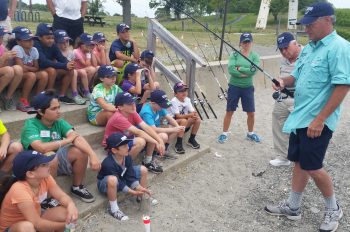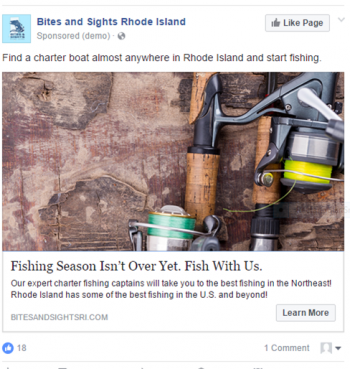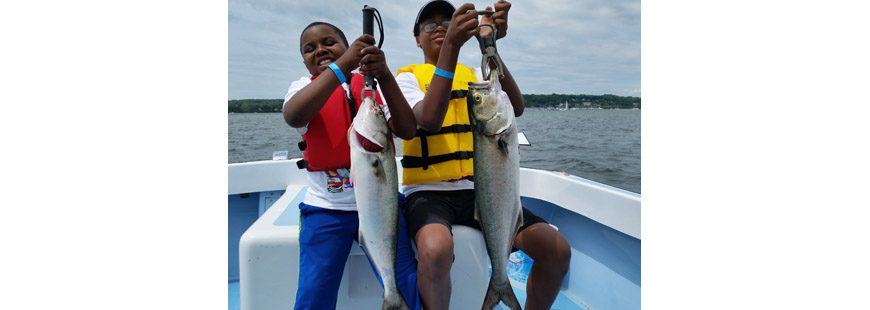How about some positive fishing news? Every day there’s a lot of discouraging fishing news with all of the regulations (necessary but often painful), state and federal fishing laws, fishing bills in Congress, climate change news and more.
So here it is, the positive, good fishing news from Rhode Island. Most of this positive news was made possible by rebuilt fish stocks (under the Magnuson-Sevens Act) so there is an abundance of fish for all to catch and eat.
Hope something here brightens your day. Please post good news from your area. We can all use it.
1. Commercial fishermen are good stewards of the environment
It was great to hear fishermen speak about wanting to create less of a carbon footprint with their vessels. At a recent commercial fisheries public workshop held by the Rhode Island Department of Environmental Management (DEM), fisherman John Walker recommended a change in license use regulations that made a lot of sense to most fishermen and fish regulators in the room.
The issue was to allow two licensed fishermen fishing on the same vessel to each take their allowable catch limit (this is done now with select species). Walker said, “When you think about the amount of fuel, the added carbon pollution and cost we incur each time we fish it makes a lot of sense to allow two licenses to work one boat… it cuts expenses in half and is a lot safer.”
Jason McNamee, chief of Marine Fisheries in Rhode Island said, “That’s a good suggestion. We are taking it under advisement and will explore if and how such a change could be implemented.”
2. Saltwater recreational fishing licenses in Rhode Island were up
They were up by about 11% in 2016, and this year they are up a further 9%. This is great fishing news. More people are interested in fishing since an angler state or federal license/registry became mandatory in 2011. An increase in licenses means an increase in revenue and spending on promoting fishing and fishing access.
John Lake of the Marine Fisheries Division said, “I would say the increase is likely driven by the economy. However, I believe that the enhanced presence of our surveyors at access points, additional outreach engaging fishing clubs and enhanced communications raises awareness of the license requirement.” Whatever the reason, more licenses means better compliance and more people engaging in saltwater fishing.
The purpose of the saltwater license program in Rhode Island as defined by state law is to provide a source of state funding for programs and activities that benefit marine recreational fishing interests in Rhode Island. If Rhode Island did not have such a program, anglers (like all coastal state anglers) would have to register with the National Marine Fisheries Service. A Rhode Island state resident license is $7, the federal registry fee is $29.
State funds raised from licenses are spent with a three-to-one federal government match through U.S. Fish and Wildlife Service Sport Fish Restoration Program. For example DEM has budgeted $232,755 in spending for FY 2017, and this 25% state of RI match will garner $698,265 in federal funds for a total RI budget of $931,020.
2017 funds will be spent on enhanced recreational fishing data collection to improve the overall precision of catch estimates and the construction of a Rocky Point State Park fishing pier (last year the Goddard Park boat ramp was built and the year before the Galilee boat ramp). Funds are allocated to maintain existing boat ramps and public fishing areas, to provide fish stock assessment support and to provide public education, information and outreach. Programs such as the RI Saltwater Fishing Magazine available in bait shops as well as a youth fishing camp are also funded from this money.
3. Fishing camp is a hoot

Top: Fishing appeals to our sense of adventure and builds a lifetime of memories with family and friends. Above: Richard Reich, lead surfcasting instructor, explains some of the fundamentals of casting to youth fishing camp participants on Rocky Point Beach, Warwick, RI.
It is important to teach our youth about fishing. Fishing appeals to our sense of adventure and teaches us patience. It is one of those activities where science and art converge. It teaches us to be good stewards of the environment and it allows us to build a lifetime of memories and friendships.
In 2016 a fishing camp for youth was developed and implemented in Rhode Island as a pilot program. The three day camp, sponsored by the Rhode Island Saltwater Anglers Association (RISAA) and the RI DEM, had 50 children 7 to 14 years old participate.
Steve Medeiros, RISAA president said, “The goal was to introduce youngsters to fishing. We find children of all backgrounds and cultures are attracted to fishing for all the right reasons, and our aim is to give them a proper introduction to the sport.”
The pilot fishing camp was a huge success, so much so that it has now been funded by U.S Fish & Wildlife in partnership with the RI DEM and RISAA for the next five years. The aim this year is to post another success and roll the camp concept out to an additional location in 2018. From there, who knows how much the camp will grow.
4. The first charter fishing industry marketing initiative has been a big success

The charter fishing industry website, www.bitesandsightsri.com, has about 9,000 visitors a month. Shown is a sample of a digital ad that pushed people to the website.
Led by Capt. Rick Bellavance of the Rhode Island Party & Charter Boat Association (RIPCBA), it’s been a big success.
The RIPCBA reached out to Deepwater Wind (DWW), developers of the Block Island Wind Farm, with a survey the Association took prior to wind farm construction. The survey demonstrated the economic impact that wind farm construction would have on the charter fishing industry.
The RIPCBA did a marketing plan that aimed to bolster the charter fishing industry in light of wind farm construction, particularly in the shoulder seasons, and asked Deepwater Wind to fund the initiative. DWW agreed to fund the two-year program, and it is working out well. In less than a year, the digital marketing effort has netted over 9,000 visitors a month to the charter industry website at www.bitesandsightsri.com.
Capt. Bellavance said, “We are now focusing on making the effort sustainable by integrating more with state marketing efforts.”
5. Best fishing show (ever) in the Northeast
The New England Saltwater Fishing Show held at the Providence Convention Center is the largest show of its type in the Northeast. This year show attendance was at a fourteen-year high. Steve Medeiros, show director and RISAA president said, “Best of all, the 15,000 attendees were in a buying mood, so much so that the 2018 show is nearly sold out of exhibitor space already. I think it could be the sign of an improved economy along with the enhanced popularity of saltwater fishing.”
This is a positive sign for all in the fishing industry… boats, electronics, gear, tackle, bait shops, tourism and all. According to NOAA, recreational saltwater fishing in Rhode Island has an annual economic impact of $200-million. With this much money on the table it is great to see interest in fishing growing.
There is a lot of positive fishing news, so let’s hear more from your region on this blog.


